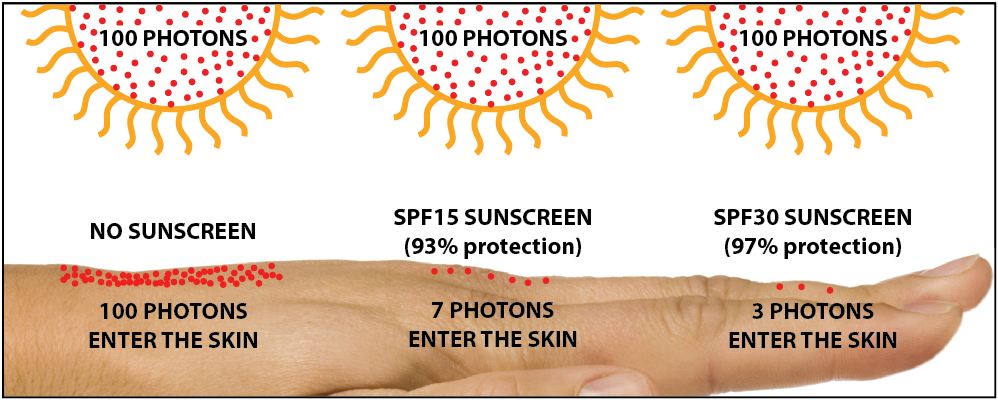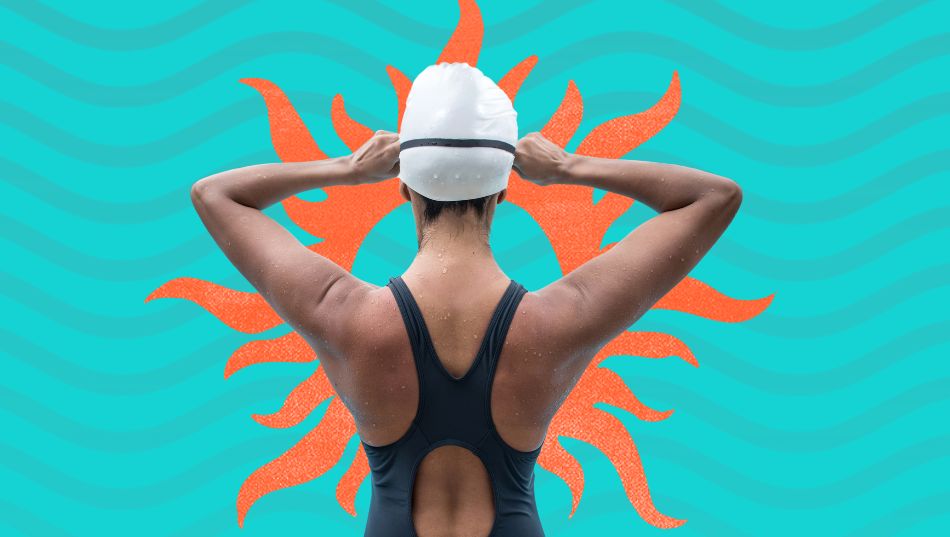What is the importance of water resistant sunscreen for swimmers?
Table of Content:
When you think of a day at the swimming pool, images of fun and relaxation under the sun come to mind. However, amidst the joy of splashing in the water, it's crucial not to overlook the importance of protecting your skin. Whether you're a professional swimmer, a casual enthusiast, or just someone who loves spending time at the pool, using the right sunscreen is essential.
In particular, water-resistant sunscreen with a high SPF rating, such as SPF 50, is a must-have. In this article, we'll explore why water-resistant sunscreen is vital for swimmers, the dangers of tanning in the pool, and how to choose the best sunscreen to keep your skin safe and healthy.
What are the various Challenge of swimming in Public Swimming Pools:
Tanning:
When you tan, your skin produces more melanin, the pigment that gives skin its color, in response to UV exposure. This is your skin's way of trying to protect itself from further harm. However, over time, repeated tanning can lead to premature aging, dark spots, and an increased risk of skin cancer.
Chlorine Exposure:
Chlorine and other pool chemicals can strip the skin of its natural oils, leading to dryness, irritation, and rashes. Read our article on use case of Pre-swim lotion for People who like to swim.
pH Imbalance:
The pH level of pool water can disrupt the skin's natural pH balance, causing dryness, irritation, and sensitivity.
Allergic Reactions:
Some individuals may have allergic reactions to pool chemicals or contaminants, leading to hives, itching, and other skin issues. Using a good post-swim chlorine removal skin care product could help to you get rid of all the pool chemical or contaminants
UV Exposure :
Outdoor pools expose swimmers to UV rays, increasing the risk of sunburn and long-term skin damage, especially when combined with the reflective properties of water.
The Difference Between Water-Resistant and Waterproof Sunscreen
Before diving into the importance of water-resistant sunscreen, it's essential to clarify the difference between water-resistant and waterproof sunscreen. While these terms are often used interchangeably, they have distinct meanings. According to the FDA, no sunscreen can be entirely waterproof or sweatproof. Sunscreens labeled as "water-resistant" are designed to maintain their SPF protection for a certain period while swimming or sweating. Typically, the label will indicate whether the product is effective for 40 or 80 minutes in water.
Water-resistant sunscreen is specially formulated to adhere to the skin even when wet. This is crucial for swimmers because regular sunscreens can wash off quickly in the water, leaving the skin unprotected. A good water-resistant sunscreen creates a barrier that withstands the pool's water and the body's natural oils, offering consistent protection against UV rays.
The Role of SPF in Sunscreen:

SPF, or Sun Protection Factor, measures a sunscreen's ability to protect the skin from UVB rays, the primary cause of sunburn. The higher the SPF, the greater the level of protection. For swimmers, using a sunscreen with a high SPF, such as SPF 50, is recommended. SPF 50 provides about 98% protection against UVB rays, significantly reducing the risk of sunburn and long-term skin damage.
It's essential to note that no sunscreen can block 100% of UV rays. Therefore, combining a high SPF sunscreen with other protective measures, such as wearing a hat, sunglasses, and UV-protective clothing, is the best way to safeguard your skin.
Choosing the Right Water-Resistant Sunscreen for Swimming
With so many sunscreens on the market, choosing the right one can be overwhelming. Here are some key factors to consider when selecting a water-resistant sunscreen for swimming:
Broad-Spectrum Protection:
Look for a sunscreen that offers broad-spectrum protection, meaning it shields against both UVA and UVB rays. UVA rays can prematurely age your skin, while UVB rays can burn your skin. Both types of rays can contribute to skin cancer.
SPF 50 or Higher:
For adequate protection during extended pool sessions, opt for a sunscreen with an SPF of at least 50. This level of protection is especially important for those with fair skin or a history of skin cancer.
Water Resistance:
Check the label for water resistance and the duration (40 or 80 minutes). Remember to reapply sunscreen every 2 hours, or more frequently if you're swimming or sweating heavily.
Sensitive Skin:
If you have sensitive skin, choose a sunscreen that is hypoallergenic and free from fragrances and dyes. Mineral sunscreens containing zinc oxide or titanium dioxide are often recommended for sensitive skin as they are less likely to cause irritation.
Application and Texture:
Consider the texture and ease of application. Some sunscreens come in sprays, lotions, or sticks. Choose a formula that you find easy to apply and comfortable on your skin. For example, sprays can be convenient for quick application, while lotions can provide more thorough coverage.
The Benefits of Using Water-Resistant Sunscreen:

Protection Against Harmful UV Rays
The most apparent benefit of using water-resistant sunscreen is protecting your skin from harmful UV rays. This protection is crucial for preventing sunburn, premature aging, and skin cancer. By choosing a water-resistant formula, you ensure that your skin remains protected even when you're in the water, significantly reducing the risk of UV damage.
Preventing Tanning Due to Chlorine
Chlorine in swimming pools can increase the skin's sensitivity to the sun, leading to tanning and potential damage. Water-resistant sunscreen helps form a barrier on the skin, protecting it from the harsh effects of chlorine and UV exposure. This is particularly important for frequent swimmers, as repeated exposure to chlorine can cause cumulative skin damage over time.
Maintaining Healthy Skin
Regular use of water-resistant sunscreen can help maintain healthy skin by preventing sunburn, dryness, and other skin issues associated with UV exposure. It also helps retain the skin's natural moisture, which can be stripped away by chlorine. Healthy, well-protected skin looks and feels better, allowing you to enjoy your time in the pool without worrying about the long-term consequences.
How to Apply Water-Resistant Sunscreen for Maximum Protection
Applying sunscreen correctly is as important as choosing the right product. Here are some tips for getting the most out of your water-resistant sunscreen:
Apply Generously: Use enough sunscreen to cover all exposed skin. A common mistake is not applying enough, which can reduce the effectiveness of the protection. A good rule of thumb is to use about one ounce (a shot glass full) to cover the entire body.
Apply Before Swimming: Apply sunscreen at least 15-30 minutes before swimming or going outside. This allows the sunscreen to fully absorb into the skin and form a protective barrier.
Reapply Regularly: Even if your sunscreen is water-resistant, it’s essential to reapply it every 2 hours, especially after swimming, sweating, or towel-drying. This ensures continuous protection throughout your time in the pool.
Don't Forget Hidden Areas: Pay attention to areas that are often overlooked, such as the ears, back of the neck, feet, and the part line of your scalp. These areas are just as vulnerable to sunburn and damage.
Combine with Other Protective Measures: While water-resistant sunscreen is a crucial line of defense, it's also essential to wear protective clothing, sunglasses, and a wide-brimmed hat. Seeking shade whenever possible can further reduce UV exposure.
Conclusion:
A day at the pool should be carefree and fun, but protecting your skin is a must. Water-resistant sunscreen with a high SPF, like SPF 50, is your best ally against the harmful effects of UV rays and chlorine. By choosing a broad-spectrum, water-resistant formula, you not only safeguard yourself from sunburn and premature aging but also prevent the skin issues caused by chlorine exposure. Remember to apply generously, reapply often, and pair your sunscreen with other protective measures like hats and sunglasses. With the right approach, you can enjoy your time in the water while keeping your skin healthy and glowing. So dive in and splash away, knowing you’re well-protected!
If you like this blog, share your feedback in the comments below
Frequently Asked questions
1)Do you need water resistant sunscreen for swimming?
AYes, water-resistant sunscreen is essential for swimming as it stays effective on the skin despite exposure to water. It helps protect against sunburn and harmful UV rays even during prolonged time in the pool.
2)What are the benefits of water resistant sunscreen?
A.Water-resistant sunscreen provides lasting protection during water activities, reducing the need for frequent reapplication. It ensures continuous defense against UV rays, helping to prevent sunburn and skin damage even when swimming or sweating.
3)What is the best skin care for swimmers?
A. The best skincare for swimmers includes using a water-resistant sunscreen before swimming, moisturizing after to combat dryness from chlorine or saltwater, and cleansing with a gentle, hydrating body wash to remove chlorine residue.
4)How can I protect my swimmers skin?
A. To protect your skin while swimming, apply a water-resistant sunscreen with SPF 30 or higher, rinse off chlorine or saltwater immediately after swimming, and moisturize thoroughly to restore hydration and prevent dryness.









